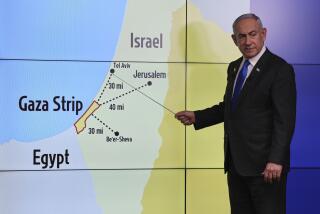NEWS ANALYSIS : Israel Left Out of Latest Deal to Free Hostages : Mideast: The earlier three-way arrangement on releases appears to have been scrapped by the militants in Lebanon.
JERUSALEM — With the prospect of more releases of Western hostages taking place soon, Israel has grown concerned that it is being excluded from the dealings and is watching glumly as chances fade for the recovery of four of its soldiers missing in Lebanon.
A frustrating irony underlies Israel’s situation: In the last few months of hostage and prisoner trading, the Israelis bridled at pressure from Washington and London to free Lebanese prisoners to smooth the release of Westerners held in Lebanon.
Hostage-holders were demanding Israeli action, but Israel insisted that word on its own soldiers be part of any deal.
Now that no one is asking Israel to release prisoners, pressure from abroad is dissipating. But so is talk of gaining the release of Israel’s missing. One of them, Ron Arad, an air force navigator, is believed to be alive; the rest, all tank crewmen, are reported to have died.
“Things have changed, and we are out of it for the moment,” a senior government official said.
The Israelis are pinning their hopes on U.N. envoys working the hostage cases. Stunned that the releases of Western hostages Terry Waite and Thomas M. Sutherland occurred without word on the Israelis, Defense Minister Moshe Arens bluntly told reporters, “We are doing everything possible to make sure we are part of this.” Foreign Minister David Levy complained that captive releases were moving forward in a “selective way” that excluded Israel.
In two earlier bargaining rounds, Israel freed 66 prisoners it had captured in combat in Lebanon; in return, it received the remains of one Israeli soldier and confirmation of the deaths of two others, while some Western hostages were freed.
Israel had expected this kind of triangular arrangement to continue: It would gradually free the estimated 250 Lebanese prisoners in its hands, in exchange for an eventual accounting and release of all Westerners and Israelis. But the hostage-holders appear to have lost interest in the Israeli part of the trade.
In a press conference Wednesday in Beirut, a senior official of Hezbollah, a militant Muslim organization, suggested that hostage-holders in Lebanon have dramatically changed their approach. They no longer make the freeing of Western hostages contingent on Israel’s release of Arab detainees.
“We should differentiate between the issue of (Israeli) prisoners and (Arab) detainees and that of the Western hostages,” said Abbas Musawi, Hezbollah’s secretary general. “The issue of the Israeli prisoners and their swap is a totally separate issue . . . .”
Officials in Damascus, Syria, interpreted the statement as a breakthrough that could clear the way for release of three Americans still in captivity: Joseph J. Cicippio, acting controller at the American University in Beirut; Beirut University professor Alann Steen, and Terry A. Anderson, chief Middle East correspondent for the Associated Press.
They said the new policy appeared to have been negotiated through Giandomenico Picco, U.N. Secretary General Javier Perez de Cuellar’s special envoy, and suggested that the Iran-backed hostage-holders had concluded that detention of Americans in Lebanon no longer carries political capital.
Expectations that Israel might get word on Arad were heightened when reports leaked out that the most prominent Lebanese prisoner held by Israel, Sheik Abdel Karim Obeid, was to appear on Israeli TV.
Israeli commandoes abducted Obeid, a Muslim preacher, in the summer of 1989 to use him as a chip to bargain for its missing soldiers. Obeid is connected with Hezbollah, which is viewed as an umbrella group for hostage-holders.
The Syrians, who are not believed to play a direct role in the hostage negotiations, speculate that the Lebanese hostage-holders still expect to win Obeid’s release.
Williams reported from Jerusalem and Murphy from Damascus, Syria.
More to Read
Sign up for Essential California
The most important California stories and recommendations in your inbox every morning.
You may occasionally receive promotional content from the Los Angeles Times.










